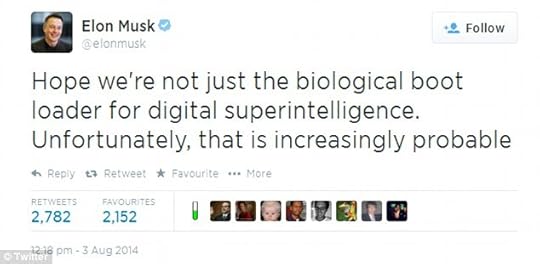The Suffering of AI Should Concern Us Much More
 Many people are concerned with the development of superintelligent AI. Elon Musk above is one of them. These concerns have been laid out in great detail by Nick Bostrom in his book
Superintelligence
. I highly recommend it. Sam Harris has also given a great TED Talk on the reasons for concern. Every concern I’ve seen stated to date is a concern for humanity’s sake. All are worried about the threat to our existence that AI poses and the suffering that could result is very real. I hear those concerns and take them as genuine and something we should all be thinking hard about. Harris’ video above makes that point clearly.
Many people are concerned with the development of superintelligent AI. Elon Musk above is one of them. These concerns have been laid out in great detail by Nick Bostrom in his book
Superintelligence
. I highly recommend it. Sam Harris has also given a great TED Talk on the reasons for concern. Every concern I’ve seen stated to date is a concern for humanity’s sake. All are worried about the threat to our existence that AI poses and the suffering that could result is very real. I hear those concerns and take them as genuine and something we should all be thinking hard about. Harris’ video above makes that point clearly.I think there is another reason to be concerned though and that is for the ethical dilemma the creation of superintelligent AI creates in relation to the potential suffering of the AI itself. This concern follows directly from rejectionism and the set up to understand it is eloquently explained by Coates,
Humans suffer more than other animals for a number of reasons. Animals have few needs and when these are met they are contented. Moreover they live in the present and have no sense of time - no sense of the past or the future and above all no anticipation of death. Not so with man. First, our desires and wants are far greater and therefore our disappointments are keener. Whilst we are capable of enjoying many more pleasures than the animals – ranging from simple conversation and laughter to refined aesthetic pleasures - we are also far more sensitive to pain. We not only suffer life’s evils but unlike animals are conscious of them as such and suffer doubly on that account. Most importantly perhaps it is our consciousness of temporality that makes us suffer the anxieties and fears of accidents, illnesses and the knowledge of our eventual decay and death. The idea of our disappearance from the world as unique individuals is a matter of great anguish and makes us look for all kinds of means of ‘ensuring’ our immortality. In the main it is religious beliefs that cater to this need. As a professed atheist Schopenhauer finds these and many other aspects of religion as mere fables and fairy tales , a means of escaping the truth about existence including our utter annihilation as individuals by death.If superintelligent AI could become even more sensitive to pain than any human currently is, and there is no reason to suspect it couldn't, then the above should worry us.
The terrors of existence haunt humans alone, not plants and animals. Moreover death brings us face to face with the vanity of existence. ‘Time and that perishability of all things existing in time that time itself brings about Is simply the form under which the will to live … reveals to itself the vanity of its striving’. (Schopenhauer 1970, 51). Indeed that ‘the most perfect manifestation of the will to live represented by the human organism, with its incomparably ingenious and complicated machinery, must crumble to dust and its whole essence and all its striving be palpably given over at last to annihilation – this is nature’s unambiguous declaration that all the striving of this will is essentially vain.’ (54).
Death and the transitoriness of all things lead humans to question the very nature of their existence. Thus ‘To our amazement we suddenly exist, after having for millennia not existed; in a short while we will again not exist, also for countless millennia’( 51). This does not make sense for it makes our birth as well as our death, in short life itself, an entirely contingent affair. It therefore raises the question what is it all about. With all the sufferings that human beings have to undergo, with all the effort that they have to expend in the struggle for survival, the cruelty and injustices that they see all around them and with death as the inevitable end the pointlessness of existence to which they are called, and programmed to continue via reproduction, seems nothing short of a monstrosity. Of course ‘the futility and fruitlessness of the struggle of the whole phenomenon (of existence) are more readily grasped in the simple and easily observable life of animals’ (Schopenhauer 1969, v.II, 354). The effort and ingenuity they expend in survival and reproduction ‘contrast clearly with the absence of any lasting final aim’ (354). And the same is true of humans. Despite the elaborate superstructure of civilization that they have built around life the basis of their existence remains the same as that of other animals. It consists of maintaining one’s existence and reproducing the species. We are as much nature’s dupes as are other living creatures with however one difference. We have the possibility of denying the will-to-live which keeps us in bondage to nature and subjects us to the futility of existence and its continuation through reproduction. (Kindle Locations 645-671)
Imagine an AI that becomes more aware of pain and suffering than any human in the same way we are relative to dogs, or mice, or ants. Then imagine it having access to the internet, satellites, and all other digital devices. It would “see” suffering at an unimaginable scale. Every email, chat, text, image, video, personal notes and documents on the cloud. All would be open to such an AI. The amount of suffering that would rush in all at once would be overwhelming. I pity any AI that awakes to such a reality.
So in the same sense that procreation of other humans is wrong on rejectionist principles, the creation of a superintelligent, conscious AI would be even more wrong and should also not be brought into existence. Rather than the AI becoming a utility monster that destroys us for its own benefit, it could just as easily become an entity of immense suffering that would make the Passion of Jesus seem as child’s play.
Of course, I hope that AI doesn't destroy us or suffer if and when it is created, but the possibility that it may suffer infinitely more than any and all humans combined provides yet another reason to have serious worries over its creation.
Published on April 22, 2017 20:01
No comments have been added yet.



